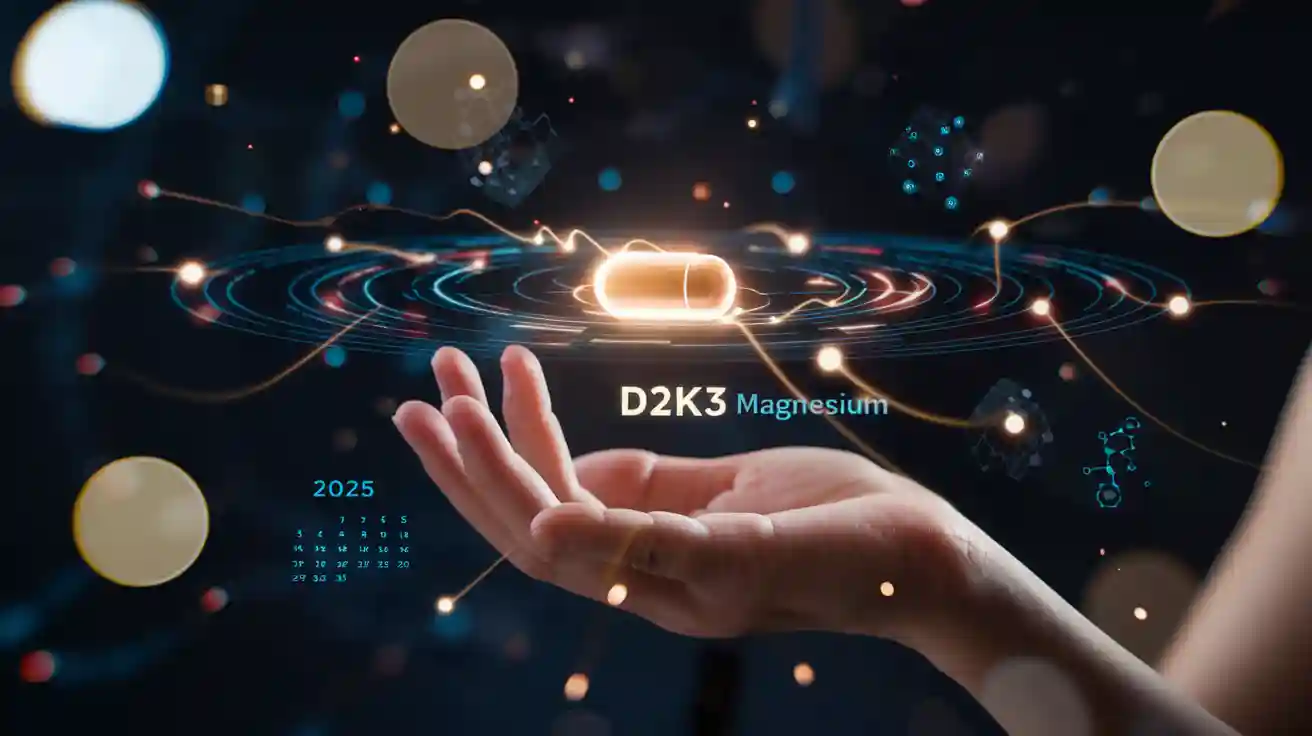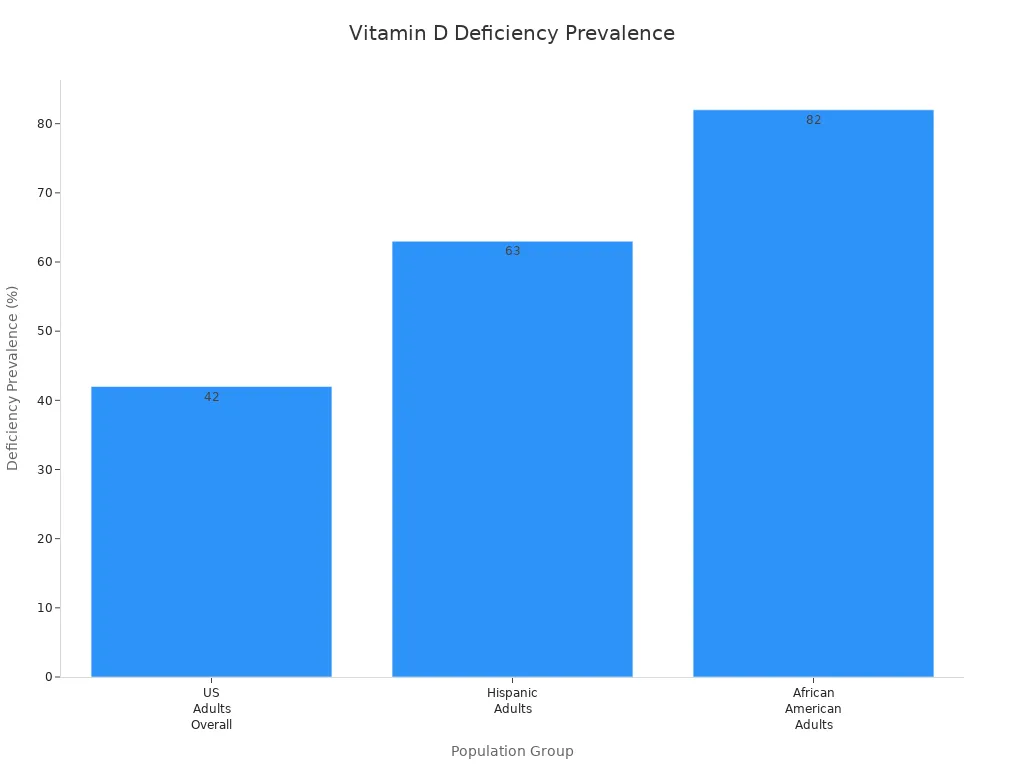Unlocking Synergistic Benefits with D2K3 Magnesium in 2025
Table of Contents

You can boost your health by using a powerful supplement combination like D2K3 Magnesium. Magnesium works with vitamin D3 and vitamin K2 to support bone strength and overall health. This mix helps your heart and keeps your body balanced. When you combine these nutrients, you unlock synergistic benefits that go beyond what each can do alone. Many experts now see this blend as key for optimal health and overall health in 2025. Think about how these synergistic benefits could help you reach your wellness goals.
Synergistic Benefits
Why Synergy Matters
You unlock greater health benefits when you combine magnesium, d3, and k2. Each nutrient plays a unique role in your body, but together they create a synergistic effect that supports your bones, heart, and immune system. Magnesium and vitamin d work together to help your body absorb and use calcium. D3 boosts calcium absorption, while k2 directs calcium to your bones and teeth, keeping it away from your arteries. This teamwork helps you build stronger bones and protects your heart.
When you take these nutrients together, you need less vitamin d to reach healthy levels in your blood. People who use both magnesium and k2 require 244% less vitamin d to reach optimal serum levels compared to those who take neither. This means you can get the same results with lower doses, reducing the risk of side effects.
Key Health Advantages
You can see the synergistic benefits in several areas of your health. Here are some key advantages:
- Bone Health: D3, k2, and magnesium work together to improve bone density and strength. K2 activates osteocalcin, a protein that helps your bones use calcium. Magnesium supports bone structure and helps your body use vitamin d more effectively.
- Heart Health: K2 keeps calcium out of your arteries, lowering the risk of hardening and supporting a healthy heart. D3 and magnesium also help regulate blood pressure and muscle function.
- Immune System Support: D3 boosts your immune system, helping you fight off illness. Magnesium helps your body respond to stress and supports overall immune function.
Here is a table showing how different supplement combinations affect bone metabolism markers:
| Supplementation Group | Key Bone Metabolism Marker Changes | Additional Observations |
|---|---|---|
| Vitamin D3 alone | Significant reduction in undercarboxylated osteocalcin (uOC) (p=0.026) and uOC/cOC index (p=0.039) | Improved glucose metabolism markers |
| Vitamin K2 alone | Significant increase in carboxylated osteocalcin (cOC) (p=0.041) | Decrease in glycemia and insulin resistance markers |
| Combined Vitamin D3 + K2 | Significant decrease in uOC/cOC index (p=0.023) | Combined effects on glucose and pancreatic beta cells |
You can see that combining d3 and k2 leads to different changes in bone markers than taking them alone. This shows the synergistic power of these nutrients for bone health.
You also benefit from magnesium and vitamin d working together. Magnesium helps your body use vitamin d more efficiently, and k2 improves the response to vitamin d. This combination supports bone formation and mineralization, and it helps direct calcium to the right places in your body.
You get more than just bone health benefits. The combination supports your heart and boosts your immune system. When you use d3, k2, and magnesium together, you unlock the full potential of these nutrients for your health.
Magnesium for Health

Role in the Body
Magnesium plays a key part in your body’s daily functions. You need magnesium to activate vitamin D3. This process uses special enzymes called cytochrome P450 enzymes. These enzymes help turn vitamin D3 into its active form, which your body can use. If you do not get enough magnesium, your body cannot make enough active vitamin D. This can lead to problems like weak bones and poor immune response.
Magnesium also helps your body absorb calcium. When you have enough magnesium, your body can use vitamin D to move calcium into your bones and teeth. If you lack magnesium, vitamin D stays inactive, and your body cannot absorb calcium well. This can cause issues with bone strength and muscle function. Your body needs a good balance of calcium and magnesium for strong bones and overall health.
Tip: Keeping your magnesium levels up helps your body use vitamin D and calcium more effectively. This supports your bones, muscles, and immune system.
- Magnesium activates over 600 enzymes in your body.
- It helps regulate blood pressure and supports nerve function.
- Magnesium deficiency can lead to muscle cramps, fatigue, and even “magnesium-dependent vitamin-D-resistant rickets.”
Magnesium Glycinate and Other Forms
You have many choices when picking a magnesium supplement. Magnesium glycinate stands out because your body absorbs it well. Studies show magnesium glycinate works better for people who have trouble absorbing magnesium. It uses a special pathway in your gut, which helps more magnesium get into your bloodstream.
Magnesium glycinate is gentle on your stomach. You are less likely to get diarrhea or stomach upset compared to other forms. This makes it a good choice for daily use. Magnesium glycinate helps with sleep, reduces anxiety, and supports brain health. It also helps lower blood pressure and supports bone density.
Other forms of magnesium, like magnesium oxide, do not absorb as well. You may need higher doses, which can cause side effects. Magnesium glycinate gives you the benefits of magnesium with fewer problems. You can use it to support your health, improve sleep, and keep your bones strong.
| Magnesium Form | Absorption Rate | Tolerance | Key Benefits |
|---|---|---|---|
| Magnesium Glycinate | High | Excellent | Sleep, anxiety, bone health |
| Magnesium Oxide | Low | Poor | May cause stomach upset |
| Magnesium Taurate | High | Good | Heart health |
Choosing magnesium glycinate helps you get the most out of your magnesium supplement. You support your health, improve absorption, and avoid common side effects.
Vitamin D3 and K2

Bone and Heart Support
You need both vitamin d3 and vitamin k2 to build healthy bones and protect your heart. Vitamin d3 helps your body absorb calcium from the food you eat. When your vitamin d3 levels are high enough, your body can increase calcium absorption from about 10-15% to as much as 40%. This boost supports bone health and keeps your bones strong as you age. The active form of vitamin d3, made in your liver and kidneys, controls how much calcium your intestines take in. This process is very important for keeping your bones healthy and for your overall health.
Vitamin k2 works with d3 to make sure the calcium you absorb goes to the right places. Your body uses vitamin k2 to activate special proteins like osteocalcin. These proteins help move calcium into your bones and teeth, making them stronger. At the same time, vitamin k2 activates another protein called matrix GLA protein (MGP). MGP stops calcium from building up in your arteries and soft tissues. This teamwork between d3 and k2 keeps your heart healthy and your bones strong.
Tip: When you take d3 and k2 together, you help your body use calcium for healthy bones and a healthy heart.
Calcium Regulation
You want calcium to go to your bones, not your arteries. Vitamin d3 increases the amount of calcium your body absorbs, but without enough vitamin k2, that calcium can end up in the wrong places. Vitamin k2 acts like a traffic director for calcium. It makes sure calcium gets stored in your bones and teeth, not in your blood vessels or organs.
Recent studies show that vitamin k2 activates proteins that keep calcium out of your arteries. This action helps prevent hardening of the arteries and lowers your risk of heart problems. The MK-7 form of vitamin k2 works especially well because it stays in your body longer and reaches tissues outside your liver. Research shows that people who eat more vitamin k2 have less calcium in their arteries and better heart health.
Here is a table that shows how vitamin k2 helps prevent calcium buildup:
| Aspect | How Vitamin K2 Helps |
|---|---|
| Calcium in Bones | Activates osteocalcin to store calcium in bones and teeth |
| Artery Protection | Activates MGP to stop calcium from entering arteries |
| Heart Health | Reduces risk of artery hardening and heart disease |
You can support your bone health and heart by making sure you get enough vitamin d3 and vitamin k2. This combination helps your body use calcium the right way, giving you strong bones and a healthy heart.
Synergy Science
Mechanisms Explained
You can unlock powerful health benefits when you use magnesium, vitamin d3, and vitamin k2 together. Each nutrient works in your body in a special way. Magnesium helps your body activate vitamin d3. You need magnesium for enzymes that turn vitamin d3 into its active form. Without enough magnesium, your body cannot use vitamin d3 well.
Vitamin d3 helps your body absorb calcium from food. You need calcium for strong bones and healthy teeth. When you have enough vitamin d3, your body can move more calcium into your bones. Vitamin k2 acts like a guide. It tells your body where to send calcium. Vitamin k2 makes sure calcium goes to your bones and teeth, not your arteries or soft tissues.
You can think of magnesium and vitamin d as a team. Magnesium helps vitamin d3 work better. Vitamin k2 joins the team and directs calcium to the right places. This teamwork keeps your bones strong and your heart safe.
Note: Scientists call this teamwork “synergy.” You get more benefits when you use these nutrients together than when you use them alone.
Here is a simple table showing how each nutrient helps your body:
| Nutrient | Main Role in Your Body | Synergy Effect |
|---|---|---|
| Magnesium | Activates vitamin d3 | Boosts vitamin d3 function |
| Vitamin d3 | Increases calcium absorption | Works with k2 for bone health |
| Vitamin k2 | Directs calcium to bones and teeth | Prevents calcium buildup in arteries |
Real-Life Impact
You can see the effects of magnesium, d3, and k2 in real-life studies. Scientists have tested these nutrients in animals and people. They found that using magnesium and vitamin d together helps build stronger bones. When you add vitamin k2, you get even better results.
One study in rats showed that giving magnesium, vitamin d3, and vitamin k2 together increased bone strength more than giving each nutrient alone. The rats had thicker bones and fewer signs of bone loss. Another study in people found that taking vitamin d3 and vitamin k2 together lowered the risk of artery hardening. People who used both nutrients had less calcium in their arteries.
You can also find studies that show magnesium helps your body use vitamin d3 better. People with low magnesium levels often have low vitamin d3 levels, even if they take supplements. When they add magnesium, their vitamin d3 levels go up.
Here are some real-life benefits you may notice:
- Stronger bones and teeth
- Lower risk of heart problems
- Better calcium balance in your body
- Improved response to vitamin d3 supplements
Tip: You can talk to your doctor about using magnesium, vitamin d3, and vitamin k2 together. Many experts say this combination gives you the best chance for strong bones and a healthy heart.
You can see that the science supports using these nutrients together. You get more benefits for your bones and heart when you use magnesium, vitamin d3, and vitamin k2 as a team.
How to Use D2K3 Magnesium
Dosage and Timing
You want to get the most out of your d3 k2 supplement, so knowing the right dosage and timing is important. Here is a table that shows the recommended daily values for adults:
| Nutrient | Recommended Daily Value (DV) | Typical Dietary Intake (Food Only) | Supplement Dosage Range |
|---|---|---|---|
| Vitamin K (all forms) | 120 mcg for adults and children 4+ | Women: ~122 mcg/day Men: ~138 mcg/day | Up to 4050 mcg in some supplements |
| Vitamin D3 | At least 600 IU (adults up to 70) | Varies | Up to 4000 IU |
| Vitamin D3 (over 70) | At least 800 IU | Varies | Up to 4000 IU |
You should take magnesium glycinate in the evening to help improve sleep quality and support recovery. Many people find that dividing their supplement doses throughout the day with meals helps their bodies absorb nutrients better and reduces stomach upset. Taking vitamin D3 in the morning or afternoon with breakfast or lunch matches your body’s natural rhythms and digestive activity.
Tip: Always check with your doctor before starting new supplements, especially if you take medications or have health conditions.
Maximizing Absorption
You can boost absorption by following a few simple steps:
- Take magnesium glycinate, vitamin D3, and vitamin K2 with meals that contain fat. This helps your body use these nutrients more efficiently.
- Choose magnesium glycinate for better absorption and fewer stomach problems.
- If you want to improve sleep quality, take magnesium glycinate before bed. This can help you relax and fall asleep faster.
- Pair your supplements with foods rich in healthy fats, like avocado or olive oil.
- Spread your doses throughout the day to support recovery and steady nutrient levels.
- Remember, combining magnesium glycinate and vitamin K2 helps your body use vitamin D3 more effectively. You need less vitamin D3 to reach healthy blood levels when you use these together.
Many people notice better sleep, faster recovery, and stronger bones when they follow these tips. You can improve sleep quality and support your body’s recovery by making magnesium glycinate part of your nightly routine. Good sleep helps your body repair and recharge, so you wake up feeling refreshed.
Safety and Concerns
Deficiency Risks
You may not realize how common vitamin d deficiency is in the United States. Nearly 42% of adults have low levels, and the rates are even higher for Hispanic and African American adults. Children and adults with vitamin d deficiency can face serious health problems. In children, this can cause rickets, which leads to soft bones, bone pain, and even seizures. Adults may develop osteomalacia, which causes weak bones and muscle spasms. People who spend little time in the sun, have darker skin, or have trouble absorbing fat are at higher risk.

You might notice symptoms like fatigue, frequent illness, bone pain, or slow wound healing if you have vitamin d deficiency. This problem can also increase your risk for depression, tooth decay, and gum disease. Magnesium deficiency often appears with vitamin d deficiency and can make these symptoms worse. If you have low levels of k2, your body may not use calcium properly, which can lead to weak bones and heart problems. Supplementing with k2 and magnesium can help prevent long-term health risks when you take vitamin d.
Here is a table that shows the main risks and who is most affected:
| Deficiency Risk Aspect | Description |
|---|---|
| Clinical Manifestations in Children | Rickets: soft bones, skeletal deformities, failure to thrive, developmental delay, seizures, cardiomyopathy, dental abnormalities |
| Clinical Manifestations in Adults | Osteomalacia: weak bones, bone pain, deformities, seizures, spasms, dental abnormalities |
| Groups at Higher Risk | Breastfed infants, older adults, people with limited sun exposure, dark-skinned individuals, those with fat absorption issues, obesity, gastric bypass surgery |
| Prevalence in US Adults | ~42% overall deficiency; 63% in Hispanic adults; 82% in African American adults |
| Causes of Deficiency | Low dietary intake, limited sun exposure, kidney conversion issues, malabsorption, lactose intolerance, vegan/ovo-vegetarian diets |
| Screening and Recommendations | No universal screening recommended; insufficient evidence for benefits of screening in asymptomatic adults |
If you want to reduce anxiety, support your bones, and keep your immune system strong, you should watch for signs of vitamin d deficiency and magnesium deficiency.
Interactions and Precautions
You need to know that k2, vitamin d, and magnesium supplements can interact with some medicines. For example, vitamin d can raise calcium levels in your blood. If you take thiazide diuretics or digoxin, this can cause heart rhythm problems. Corticosteroids and antiseizure drugs can lower vitamin d levels, making deficiency more likely. K2 can affect blood thinners, so you should talk to your doctor if you take warfarin or similar medications.
Magnesium deficiency can also affect how your body uses vitamin d and k2. If you take antibiotics, thyroid medicine, or osteoporosis drugs, magnesium can lower how well these medicines work. You should separate the timing of your supplements and medicines by a few hours.
Here is a table showing some common interactions:
| Supplement | Medication Class/Drug | Interaction Description | Management/Notes |
|---|---|---|---|
| Magnesium deficiency | Antibiotics (ciprofloxacin, doxycycline) | Decreases antibiotic effect | Separate by 2-6 hours |
| Vitamin d deficiency | Thiazide diuretics, digoxin | Raises calcium, risk of heart issues | Monitor calcium levels |
| K2 | Warfarin (blood thinner) | Reduces blood thinner effect | Consult your doctor |
Most people can safely take k2 and vitamin d together at recommended doses. Vitamin d toxicity is rare but can happen if you take too much. Signs include nausea, confusion, and heart rhythm changes. K2 helps protect your heart by guiding calcium to your bones. Always check with your healthcare provider before starting new supplements, especially if you take other medicines or have health problems.
You gain many benefits when you use D2K3 Magnesium. This combination helps your bones, heart, and muscles work better. You support your body’s calcium balance and improve vitamin D levels.
- Magnesium, vitamin D3, and vitamin K2 work together to boost bone strength and lower the risk of heart problems.
- Bioavailable forms like magnesium glycinate and vitamin K2-7 help your body absorb nutrients well.
Always talk to your doctor before starting new supplements. D2K3 Magnesium can help you reach your wellness goals in 2025.
FAQ
What is D2K3 Magnesium?
D2K3 Magnesium is a supplement that combines magnesium, vitamin D3, and vitamin K2. You get support for your bones, heart, and immune system in one product. This blend helps your body use calcium the right way.
Can you take D2K3 Magnesium every day?
Yes, you can take D2K3 Magnesium daily. Most people use it as part of their routine. You should follow the recommended dosage on the label or ask your doctor for advice.
Who should avoid D2K3 Magnesium?
You should avoid D2K3 Magnesium if you take blood thinners, have kidney problems, or use certain heart medicines. Always check with your doctor before starting any new supplement.
What are the signs you need more magnesium, D3, or K2?
You may feel tired, get muscle cramps, or notice weak bones if you lack these nutrients. You might also get sick more often. If you see these signs, talk to your doctor.
How can you get the best results from D2K3 Magnesium?
Take D2K3 Magnesium with meals that have healthy fats. This helps your body absorb the nutrients. Try to take magnesium in the evening for better sleep. Spread your doses during the day for steady support.

Poseidon
Master of Nutritional Epidemiology, University of Copenhagen, Herbal Functional Nutrition Researcher
Focus: The scientific application of natural active ingredients such as Tongo Ali, Horny Goat Weed, and Maca to sexual health and metabolic regulation.
Core Focus:
Men: Use a combination of Tongo Ali (an energizing factor) + Maca (an energy reserve) to improve low energy and fluctuating libido.
Women: Use a combination of Horny Goat Weed (a gentle regulator) + Maca (a nutritional synergist) to alleviate low libido and hormonal imbalances.
Stressed/Middle-Aged Adults: This triple-ingredient synergy supports metabolism, physical strength, and intimacy.
Product Concept:
Based on traditional applications and modern research (e.g., Tongo Ali promotes testosterone-enhancing enzyme activity, and icariin provides gentle regulation), we preserve core active ingredients and eschew conceptual packaging—using natural ingredients to address specific needs.
Simply put: I'm a nutritionist who understands "herbal actives." I use scientifically proven ingredients like Tongo Ali, Epimedium, and Maca to help you make "sexual health" and "nutritional support" a daily routine.
